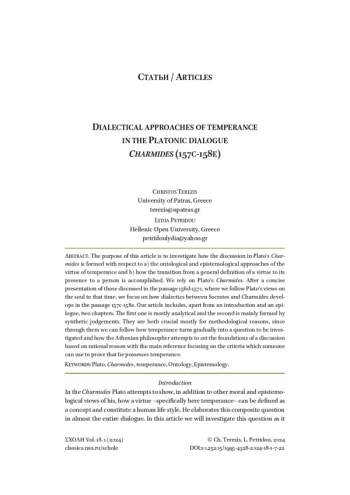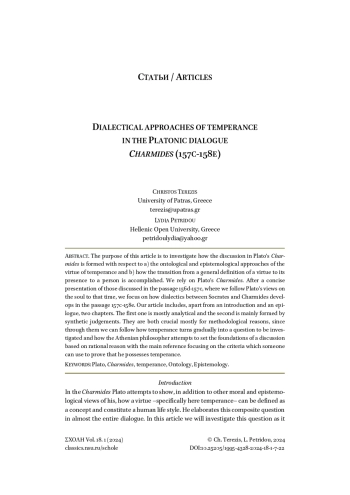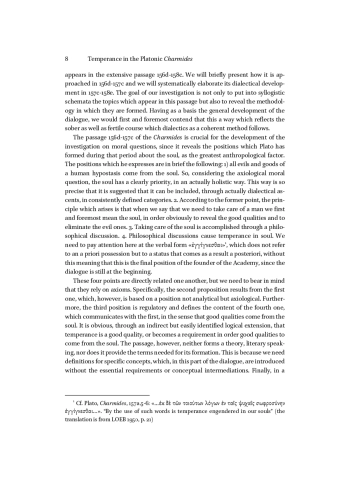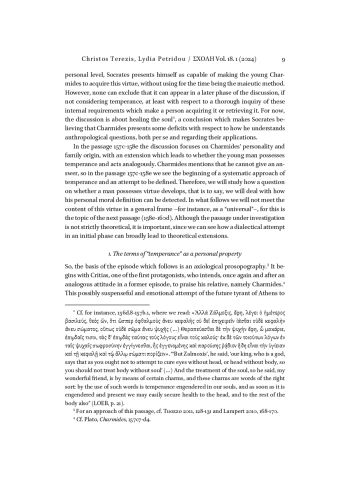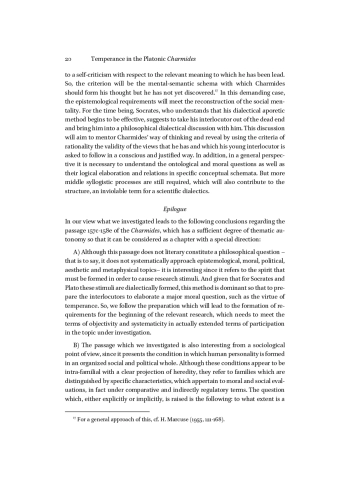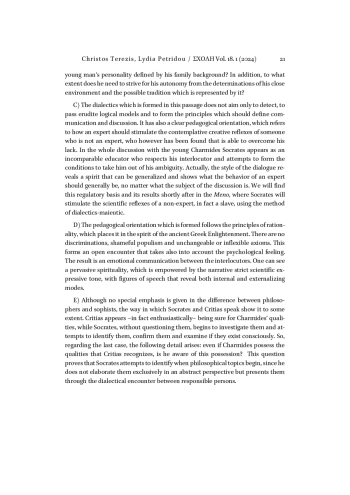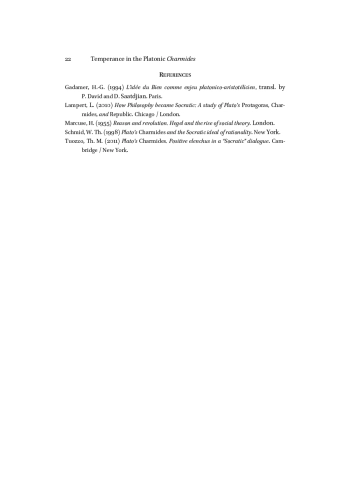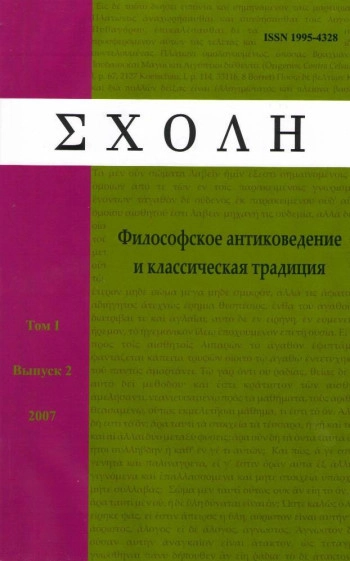Цель этой статьи — исследовать, как в «Хармиде» Платона формируется дискуссия по поводу а) онтологического и эпистемологического подходов к добродетели умеренности и б) перехода от общего определения добродетели к её проявлению в человеке. Мы опираемся на «Хармид» Платона. После краткого изложения того, что обсуждалось в отрывке 156d-157c, где мы следуем взглядам Платона на душу того времени, мы сосредоточимся на том, как развивается диалектика между Сократом и Хармидом в отрывке 157c-158e. Наша статья включает в себя, помимо введения и эпилога, две главы. Первая глава в основном аналитическая, а вторая состоит в основном из синтетических суждений. Оба они важны в основном по методологическим причинам, поскольку с их помощью мы можем проследить, как умеренность постепенно превращается в вопрос, требующий изучения, и как афинский философ пытается заложить основы дискуссии, основанной на рациональном мышлении, уделяя основное внимание критериям, которые человек может использовать, чтобы доказать, что он обладает умеренностью.
The purpose of this article is to investigate how the discussion in Plato’s Charmides is formed with respect to a) the ontological and epistemological approaches of the virtue of temperance and b) how the transition from a general definition of a virtue to its presence to a person is accomplished. We rely on Plato’s Charmides. After a concise presentation of those discussed in the passage 156d-157c, where we follow Plato’s views on the soul to that time, we focus on how dialectics between Socrates and Charmides develops in the passage 157c-158e. Our article includes, apart from an introduction and an epilogue, two chapters. The first one is mostly analytical and the second is mainly formed by synthetic judgements. They are both crucial mostly for methodological reasons, since through them we can follow how temperance turns gradually into a question to be investigated and how the Athenian philosopher attempts to set the foundations of a discussion based on rational reason with the main reference focusing on the criteria which someone can use to prove that he possesses temperance.
Идентификаторы и классификаторы
Выпуск
Другие статьи выпуска
This article deals with the art of geometric ornaments, widely spread in the whole Islamic world. This art appeared at the beginning of the 11th century in Khorasan and Transoxania, rapidly developed in the next two centuries until the Mongol invasion, transferred from here to Damascus, Cairo and further to the Maghreb countries, and then flourished again in the Timurid Empire, when multi-color solutions were added to complicated geometry of star polygons. We consider various principles for constructing these patterns, with special attention to so called “polygonal technique”.
В статье рассматривается вопрос о названии «Деяний апостолов», который был предметом дискуссий со времён раннего христианства. Святой Иоанн Златоуст также уделял внимание этому вопросу. Помимо его комментария к «Деяниям апостолов», состоящего из 55 глав (In Acta apostolorum), есть также 4 проповеди под названием In principium Actorum, которые посвящены вопросу о названии Деяния апостолов и это произведение назывались «Деяниями», а не «Знамениями» или «Чудесами». Мы пытались показать, что последнее произведение следует рассматривать не как толкование, а как вводную главу или пролегомены. Такие вводные главы, необходимые для обучения и подготовки, были написаны в ранние времена христианства многими авторами до того, как они составили свои толкования какого-либо произведения. Эти небольшие по объёму труды служили своего рода паратекстами и не всегда доходили до нас. В неопубликованном средневековом армянском сборнике «Библейские исагогики», составленном в конце XII — начале XIII века настоятелем Санаинского монастыря Григором, сыном Абаса, есть пролог, приписываемый Иоанну Златоусту, в котором рассматривается этот вопрос, то есть Деяния апостолов. На самом деле эта исагогическая глава представляет собой сокращённую версию 4-х проповедей, в которой в то же время есть некоторые отрывки, отличающиеся от рассматриваемого произведения. Данные, сохранившиеся в этом армянском учебнике, весьма полезны для прояснения многих вопросов. Можно сделать вывод, что Иоанн Златоуст также использовал исагогическую схему, которую до сих пор приписывали только неоплатоническим комментаторам и двум или трём христианским авторам, таким как Ориген и Прокл.
Предметом исследования является история рецепции наследия стоиков в российской периодике (журналах, газетах, сборниках трудов), издававшейся в XIX веке. Что касается характера и содержания публикаций, написанных в начале XIX века и посвящённых стоикам, они продолжали традиции XVIII века. Они сохраняли назидательный и развлекательный характер, иногда демонстрируя недостаток научности и оригинальности. Важным событием, вызвавшим интерес к стоикам среди образованной русской публики, стала широкая дискуссия в ряде крупных журналов и газет о трудах Г. Буасье, К. Марты и Э. Ренана, переведённых на русский язык или опубликованных в 1879–1881 годах. В последние десятилетия XIX века периодические издания в России также способствовали поддержанию интереса к философам-стоикам. На страницах журналов и газет восхвалялись и отвергались моральные стратегии и религиозные взгляды стоиков; активно обсуждались новые переводы текстов стоиков и критические работы о стоиках; некоторые аспекты идей стоиков оказались в центре внимания публицистов разного рода — от революционеров до учёных и богословов. Поскольку периодические издания имели свою специфику, отличную от работ, написанных для учёных или студентов, они сыграли важную роль в формировании восприятия стоиков в российском обществе. Они также внесли свой вклад в процесс формирования прочной основы для дальнейшего изучения стоицизма (и в более широком смысле античности) в России в начале XX века.
Статья содержит первую латинскую транскрипцию и английский перевод первой части второй книги «Опуса» Гуго Сен-Шерского, его комментария к «Сентенциям» Петра Ломбардского, написанного между 1231 и 1234 годами. Транскрипция основана на кодексе Vat. lat. 1098, сопоставленном с пятью вспомогательными рукописями. Вслед за Гильомом из Осера и Александром из Галеса Хью критически отвергает языческие и еретические взгляды Платона, Аристотеля, Эпикура и манихеев на сотворение мира. Моё предисловие проливает свет на философскую ценность представленных аргументов, а также на историческую подоплёку вопроса и связь Хью с современными ему богословами, чьи идеи Хью перестраивает и видоизменяет в одном кратком тексте. Я утверждаю, что Хью объединяет эти четыре авторитетных источника, чтобы оспорить и отвергнуть концепции вечности и дуализма. Богослов приписывает дуализм — вопреки общепринятому представлению о трёх началах — Стагириту, в то же время вкладывая в уста катаров концепцию противоположных принципов Аристотеля, на которую ранее ссылался Уильям. Даже Платон и Эпикур становятся сторонниками еретического отрицания сотворения из ничего в пользу божественного происхождения из соприродной материи, что сближает греков с метафизикой катаров. «Опус» Гуго, если и не был оригинальным в современном смысле, предвосхитил волну опровержений, направленных против еретиков и «аверроистов». Предполагаемый изоморфизм между Аристотелем-еретиком и катаром-перипатетиком частично сформировал ранние аргументы в богословских «Сентенциях», а также в инквизиторской «Сумме». В то время как интерес к дуализму катаров угас, когда они были жестоко истреблены, доводы Уильяма, Александра и Хью против перипатетического взгляда на вечность продолжали привлекать внимание богословов, боровшихся с «аверроизмом».
В публикации представлен комментированный русский перевод краткого сборника под названием «Τίνα περὶ δαιμόνων δοξάζουσιν Ἕλληνες» («Что эллины думают о демонах», лат. Graecorum opiniones de daemonibus), приписываемого Михаилу Пселлу (1018 — ок. 1078). Текст представляет собой краткий обзор религиозных и смежных с ними практик «эллинов», то есть языческих греков, с точки зрения неоплатоников, восходящей, в конечном счёте, к «Халдейским оракулам», «Библии неоплатоников», как назвал это частично сохранившееся собрание II века н. э. Франц Кумон. Несомненно, Михаил Пселл находился под сильным влиянием «Оракулов», а также утраченного комментария Прокла к этому труду. Тем не менее, приписывание Михаилу Пселлу «Мнений», а также диалога «Тимофей, или О демонах» (Τιμόθεος ἢ περὶ δαιμόνων), другого, несколько более обширного эссе на те же темы (демонизм, жертвоприношения, мистерии, колдовство, магия, гадания), кажется совершенно неубедительным, если судить по чисто формальным (лингвистическим) критериям. Гораздо правдоподобнее было бы приписать эти труды ученикам или последователям этого выдающегося представителя византийского протогуманизма, обозначив этих анонимных авторов как «Псевдо-Пселл». Текст «Мнений» позволяет быстро обнаружить множество перекрёстных ссылок не только на Прокла, но и на других неоплатоников (Порфирия, Ямвлиха, Синезия), а раздел о мистериях почти дословно заимствован (хотя и не без вопиющих искажений) из «Протрептик» Климента Александрийского. Русский перевод основан на издании Поля Готье (1988), которое, в свою очередь, основано на древнейшей рукописи Vaticanus gr. 1411 (fin. s. xiv), содержащей текст компиляции (стр. 33r–34v).
Орфическая «теогония Иеронима и Гелланика» известна благодаря Афинодору (II век) и Дамаскию (VI век), и наши информаторы по-разному подходят к тексту теогонии. Афинодор читает его буквально, стремясь показать всю безнравственность орфизма, в то время как Дамаский, в типичной неоплатонической манере, понимает его аллегорически и использует для иллюстрации собственной теологической позиции. Мы не знаем, кто такие Иероним и Гелланик, но теогония, рассказанная от их имени, примечательна, уникальна во многих отношениях и представляет собой своего рода переходный тип между ранней орфической теогонией и более поздней рапсодической теогонией. Это достигается, прежде всего, за счёт расширения числа персонажей, вовлечённых в историю. В то время как ранние теогонии обычно начинались с фигур Ночи и Океана с Тефидой, теперь им предшествует Хронос. Кроме того, в «Иерониме» и «Гелланике» (если Афинагор использует только один источник), а затем в «Рапсодиях» Дионис появляется в теогонии, завершая генеалогию богов: совокупившись в образе змея с Деметрой, Зевс рождает Персефону, которая, также в союзе с Зевсом, становится матерью Диониса. В этой статье мы предлагаем читателю аналитическое прочтение сохранившихся фрагментов этой версии орфической теогонии с подробным комментарием.
В этой статье рассматривается вопрос о том, как личностный элемент, ставший отправной точкой движения к индивидуальному мышлению, проявился в культуре древнего Израиля и культуре древней Индии. В статье предпринята попытка описать особенности этих культур, которые, в отличие от древнеегипетской и шумеро-аккадской, позволили пройти этот путь до конца. Прослеживается процесс формирования монотеизма от догосударственного периода до великих пророков. Отмечается, что социально-политическая жизнь, которая с такой силой определяла статус человека в ряде других ближневосточных культур, в израильской культуре была подчинена религиозной жизни, которая в свою очередь определяла осознание человеком своего статуса. Таким образом, постепенно преодолевается генотеизм. В сознании израильского народа утверждается идея полной зависимости от Бога, который открывает себя через пророков и устанавливает требование личного отношения к нему. В то же время Бог, выступающий гарантом справедливости, раскрывается через проблему теодицеи, которую может поставить только свободная личность. Движение мысли в древней Индии оказывается противоположным тому, что мы видим в древнем Израиле: в то время как в последнем происходит долгое, но неуклонное движение к монотеизму, индийский брахманизм принимает великое разнообразие божественной реальности и, утверждая её единство, лишь умножает число её составляющих. Решающим периодом для возникновения индивидуального сознания стал период Упанишад. В это время углублённое понимание текстов Вед приводит к тому, что философское знание выстраивается поверх религиозного. Специфика индийского сознания определяется длительным периодом его устного существования, когда звучащая речь в ритуале или в процессе медитации приобретает ключевое значение для осознания единства мира. Индивидуальное сознание проявляется в процессе концентрации, направленной на понимание, а не на простое воспроизведение ритуальных мантр. Свою роль здесь сыграла практика аскетизма. Как и в некоторых других культурах, в Индии настоящее авторство появляется в Осевой период как важный признак осознания индивидуального творчества.
Heliocentrism played an important role in the formation of ancient theoretical astronomy. However, as we know, the geocentric theory won the competition. Nonetheless, in the writings of Julian the Apostate we can see the reminiscences if not of the heliocentrism of Aristarchus of Samos then elements of the cosmology of Heraclides Ponticus. The paper points out to what extent these “reminiscences” have a rhetorical character, emphasizing the influence of the heliolatry of the Chaldean Oracles on Julian. It also interprets to what extent the emperor-philosopher himself accepted “unorthodox” models of the universe. Perhaps the intuition that the cosmology of Neoplatonism of the Syrian and Pergamon school deviated from the traditional one for their epoch can be seen in Dmitri Merezhkovsky’s novel The Death of the Gods (Julian the Apostate).
Sonnet 146 not only stands apart from Shakespeare’s sonnets, but, in fact, is a complete philosophical and theological poetic pamphlet. As for the soteriological context of sonnet 146, which represents the idea of abandoning the concerns of the body and saving the soul by “feeding” it with the body, one could, first of all, note the New Testament passages from apostle Paul about “mortification” of the flesh and fleshly passions for the salvation of the soul: Rom. 8:13 (cf. also: 7:5; 8:7); Col. 3:5 (cf. further, e. g.: 1 Cor. 3:1, 3); Gal. 5:24. But as for the allegory of the soul’s salvation through its “feeding” on the flesh — instead of feeding the flesh, as it is usually done by the people that death “feeds” on — one can see here a reflection and a kind of “reverse” reinterpretation of M. Ficino’s doctrine of the “nutritive/sc. feeding soul” (anima nutritiva), which he develops in his “Plato’s Theology”. Passages of “Plato’s Theology” VII, 9; XIII, 5; VI, 12; XVIII, 9 are particularly representative in this regard. In XVIII, 9 Ficino writes: “If at present the life of the composite man is subject to the conditions of his decay-prone body, in the future it will follow the conditions of the immortal soul. As a result, death will give way to life in accord with the most perfect kind of natural beginnings. Death, which has lost its power, as the prophets tell us, will be swallowed up by life… There will arise… eternal bodies.” By “prophets” here primarily Hosea (13:14), whom the apostle Paul quotes (1 Cor. 15:55 [cf. also: 1 Сor. 15:26; Rev. 21:4]), and Isaiah (25:8 [cf. its reminiscence in 1 Cor. 15:54]; cf. also, e. g.: Isa. 26:19, 41:14; Dan. 12:2, 13) are meant. The last line of sonnet 146 (“And death once dead, ther’s no more dying then” [сf. also: sonnets 55, line 13; 60, line 13; 122, line 4]) correlates with Rev. 21:4, as well as with the passage from Ficino XVIII, 9.
The article attempts to reconstruct Gorgias’ theory of logos. It is shown that the logos, hiding reality, produces infinite existential possibilities in the consciousness of the subject, connected not with truth, but with doxa. The article also suggests that Gorgias, unlike Parmenides, limited the use of the logos only to this world. In our world, the phenomena of consciousness, qualia, all perceptual acts are somehow linguistically encoded. When we approach the realm of the transcendent, the language falls silent, and any attempt to describe such an experience turn out to be profanation. Of the diverse discourses that exist in our world, according to Gorgias, only poetic creativity is authentic, which, being in no way connected with objective reality, creates an entirely fictional world of art, where only true empathy through catharsis, i. e. morality, is possible.
In this article, I discuss the concept of matter - both the first matter and the physical matter of the world, that is, elements - in Byzantine philosophy of the 11th century, namely, in the works of Michael Psellos and John Italos. In particular, I am interested in how the concept of matter is interpreted in connection with the idea of Creation and the finiteness of the world. I trace the connection between the philosophy of the 11th century and the late ancient discussions about matter. I focus on Philoponus’ arguments against the eternity of the world and his definition of matter as a three-dimensional extension as well as on the Simplicius’ analysis of matter as a principle of corporality. However, it is important for me to show not only the dependence of the Byzantine philosophers on Philoponus and Simplicius, but also their autonomy in defining philosophical terms. The intellectual horizon of Michael Psellos’ and John Italos’ thought, which influences the approach of these philosophers to the discussion of physical concepts, differs from the horizon of late ancient philosophy.
В статье рассматривается вопрос о взаимосвязи этики и физики в философии Эпикура. Установлено, что физика играет первостепенную роль в философии Эпикура. Согласно Эпикуру, физическая теория способствует формированию особого взгляда человека на мир, который устраняет страх перед силами природы, возвышает над социальной реальностью, освобождает от мифов и обеспечивает жизнь без тревог и волнений. Этика в Эпикур играет роль дополнительного учения, призванного избавить от пустых желаний и тревог, источником которых является общество.
Контакты Китая с греческим миром, как показано в предыдущих исследованиях, были обширными в хронологическом плане. Несомненно, они начались в древности и продолжались вплоть до развитого Средневековья (римское посольство в Китае династии Сун). Однако в отечественной и зарубежной научной литературе часто встречаются весьма сомнительные примеры связей между Дальним Востоком и греческой культурой. В этой статье мы рассмотрим некоторые из них. Примечательно, что при изучении греко-китайских контактов часто приходится решать вопросы, касающиеся этнокультурной ситуации в «мире ранних кочевников». Последний простирался от Северного Причерноморья до Забайкалья и Ордоса. В статье также рассматривается проблема сопоставления «этнонимов» из нарративных источников с археологическими культурами, памятники которых были найдены на севере Китайской Народной Республики.
В статье рассматривается проблема атрибуции текстов, цитируемых Файласуфом аль-Фараби в его книге «Гармония двух мудрецов». Автор доказывает, что, вопреки мнению современных западных учёных (П. Адамсона, Ф. Циммермана), аль-Фараби хорошо знал хорошо известную исследователям вульгатную версию апокрифа «Теология Аристотеля», которую он использовал при работе над текстом «Гармонии…». Это также свидетельствует о том, что мыслитель время от времени обращался к фрагментам «Элементов теологии» Прокла, включённым в арабский корпус Аристотеля. Отдельно в статье обсуждается роль «Теологии» Псевдо-Аристотеля в становлении мистических учений восточных перипатетиков.
В статье рассматриваются две речи Максима Тирского, посвящённые активной и созерцательной жизни (XV–XVI). Параллели с другими авторами (Апулеем, Алкеновом) показывают, что эта тема стала популярной в платонической традиции. Максим использует хорошо проработанный материал, но применяет новую форму его изложения — двойные речи (disputatio in utramque partem). В этой статье представлен краткий обзор проблемы активной и созерцательной жизни, чтобы обозначить контекст, в котором следует рассматривать философские речи Максима. Несмотря на то, что в речах нет оригинальных идей, представляется интересным изучить использование платоновского материала и выбор диалогов, которые использовались для аргументации тезиса и антитезиса. Анализ речей показывает, как Максим использует диалоги «Горгий» и «Государство», заимствуя некоторые образы и тематические отрывки. «Апология Сократа» Платона занимает особое место в композиции шестнадцатой речи. Используя работу Платона в качестве образца, Максим пишет речь, которую Анаксагор мог бы произнести перед жителями Клазомен, защищая свой образ жизни.
В этой статье я рассматриваю концепцию материи — как первичной материи, так и физической материи мира, то есть элементов — в византийской философии XI века, а именно в трудах Михаила Пселла и Иоанна Итала. В частности, меня интересует, как концепция материи интерпретируется в связи с идеей сотворения и конечности мира. Я прослеживаю связь между философией XI века и позднеантичными дискуссиями о материи. Я сосредоточусь на аргументах Филопона против идеи вечности мира и его определении материи как трёхмерного протяжения, а также на анализе материи как принципа телесности у Симпликия. Однако для меня важно показать не только зависимость византийских философов от Филопона и Симпликия, но и их самостоятельность в определении философских терминов. Интеллектуальный горизонт мышления Михаила Пселла и Иоанна Итала, который влияет на подход этих философов к обсуждению физических концепций, отличается от горизонта поздней античной философии.
Проблема соотношения философии и риторики, которая широко обсуждалась в поздней античности, вновь становится актуальной в Византии в XI–XII веках. Задача данной статьи — определить, какую позицию по этому вопросу занимал Михаил Италик († до 1157 года), византийский учёный, ритор и философ-неоплатоник. Уже отмечалось, что в двух своих работах Италик сформулировал две противоположные точки зрения: в одной он утверждал, что философия бесполезна и намного уступает риторике, а в другой превозносил философию, способную не только исследовать абстрактные предметы, но и заботиться о человеческом благе. В статье анализируются эти и другие тексты, в которых Италик рассуждает о философии и риторике. Показано, что Италик отдавал предпочтение философии, но также высоко ценил красноречие. Сделан вывод, что идеал Михаила Италик, как и другие авторы того периода, был синтезом философской мысли и риторической элегантности. В его работах приводятся примеры, показывающие, как этот синтез реализовывался на практике. Этой позиции противоречит лишь одно небольшое эссе Италика, в котором он утверждает превосходство риторики над философией. Этот текст, довольно необычный в контексте позднеантичной и византийской традиции, вероятно, является примером риторической игры, не отражающей взглядов автора.
Размышления об интеллектуальных способностях и их правильном применении начинаются с разговора о божественном духе и человеческой душе. Гераклит, по-видимому, первым объяснил, что все высшие умственные способности основаны на этическом формировании. Таким образом, самосознание приводит, как это также видит Гегель, к нормативной социальности как своей трансцендентальной основе.
Настоящее исследование направлено на углубление понимания политической философии Ксенофонта, отражённой в исследовании Сократом экономических знаний в диалоге под названием «О экономике». В исследовании основное внимание уделяется шести традиционным составляющим ойкоса, или домашнего хозяйства (дом, вещи, рабы, земля, лошади и жена), которые тесно связаны с шестью аспектами человеческой жизни (удовольствие, порядок, власть, досуг, обогащение и образование), представленными идеальным джентльменом (богатым и успешным) Исократом и его учеником, (бедным и несчастным) философом Сократом. Это демонстрирует, как Сократ, изучая экономическое учение Исократа, радикально трансформирует его, одновременно показывая наиболее серьёзные возможности, лежащие в основе общепринятых представлений об экономической и политической жизни, а также присущие им ограничения в их реализации, которые угрожают подорвать (и действительно подрывают, в случае с Сократом) общепринятые представления о жизни.
В статье высказывается предположение о возможной отсылке к «Сатирикону» Петрония в романе Федерико Феллини «Брачное агентство» (Un’agenzia matrimoniale), который является частью фильма-антологии «Любовь в городе» (L’amore in città, 1953), снятого группой итальянских режиссёров. Итальянский кинорежиссёр неоднократно признавался, что открыл для себя Петрония ещё в годы учёбы в лицее в Римини. Автор статьи приводит аргументы, свидетельствующие о возможном влиянии Петрония на Феллини; он проводит параллели между древней историей ужасов, рассказанной вольноотпущенником Ницеросом на пиру у Тримальхиона (Сат. 61–62), и современной историей, созданной Федерико Феллини. Эти параллели в историях об оборотнях (versipellis), встречающихся в «Сатириконе» Петрония и в «Брачном агентстве» Феллини, являются правдоподобными совпадениями. Феллини выбрал историю об оборотне, которая, возможно, была навеяна романом Петрония, оказавшим на него большое влияние в юности. А история ужасов о ликантропе, рассказанная Ницеросом, несомненно, является одной из самых запоминающихся на «Пире Тримальхиона». Если предположение, высказанное в статье, верно, то «Брачное агентство» — это ещё один фильм Феллини, в котором, наряду с «Сатириконом», фигурирует Петроний, и, что самое важное, это произошло за полвека до его «историографического» шедевра.
В этой статье рассматривается вопрос об идентификации божества, изображаемого в виде человека со львиной головой, которое ассоциировалось с Эоном и отождествлялось с орфическим богом Хроносом. Автор оспаривает отождествление Эона с орфическим Хроносом, опираясь на свидетельства Прокла и Дамаския, которые выделяют Эона как отдельную сущность, отличную от Хроноса. Кроме того, автор предпринимает попытку проиллюстрировать орфического бога Хроноса на основе описания Дамаския.
В этом эссе будет рассмотрена функция персонификации самого Парменида в образе коня Ибикуса в «Пармениде» Платона. Анализируя это отступление Парменида, мы продемонстрируем, что персонификация является аллегорическим элементом Платона, роль которого в диалоге имеет решающее значение для понимания замысла автора во второй, более обширной части «Парменида».
В статье рассматриваются антропологические и эсхатологические вопросы в работе Псевдо-Апулея «Асклепий, или Диалог Гермеса Трисмегиста». В этом контексте поднимаются вопросы о зле в моральном смысле и об источниках зла, понимаемого таким образом.
Статистика статьи
Статистика просмотров за 2025 - 2026 год.
Издательство
- Издательство
- Новосибирский Государственный Университет
- Регион
- Россия, Новосибирск
- Почтовый адрес
- 630090, Новосибирская область, г. Новосибирск, ул. Пирогова, д. 1.
- Юр. адрес
- 630090, Новосибирская область, г. Новосибирск, ул. Пирогова, д. 1.
- ФИО
- Федорук Михаил Петрович (Руководитель)
- E-mail адрес
- rector@nsu.ru
- Контактный телефон
- +7 (383) 3634000
- Сайт
- https://www.nsu.ru/
